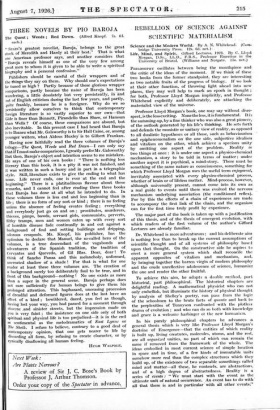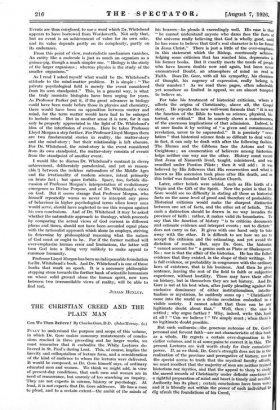REBELLION OF SCIENCE AG-AINST SCIENTIFIC MATERIALISM , -
Life, Mind, and Spirit. Gifford Lectures, 1923. By C. Lloyd Morgan, D.Sc., LL.D., F.R.S., Professor Emeritus in the University of Bristol. (Williams and Norgate. 15s. net:) '
PHILOSOPHY oscillates between being the mouthpiece and
the critic of -the ideas -of the moment. If we think of these two books from the former standpoint, they are interesting as two notable fruits of the progress of biology. If we look at their other function, of throwing light ahead into new places, they may well help to mark an epoch in thought ; for both, Professor Lloyd Morgan implicitly, and Professor. Whitehead explicitly and deliberately, are attacking the materialist view of the universe.
Professor Lloyd Morgan's book, one may say without disre. spect, is the lessexciting. None the less, it is fundamental. ft i3
the summing-up, by a fine thinker who was also a great pioneer,' of the outlook generated by his life's thinking. He sets forth and defends the monistic or unitary view of reality, as opposed' to all dualistic hypotheses or all those, such as -behaviourism and epiphenomenalism on- the one side, subjective idealism and vitalism on the other, which achieve a specious unity by omitting one aspect of the problem. Reality is two things at once : it is under one aspect a physico-chemical mechanism, a story to be told in terms of matter ; under another aspect it is psychical; a mind-story. There must be something of the.same nature as consciousness, something for which Professor Lloyd Morgan uses the useful term enjoyment, inevitably associated with every physico-chemical process, whether of brain or of lifeless matter. Mind-process, however,
although universally present, cannot come into its own as a real guide to events until there was evolved the nervous mechanism underlying association (the conditioned reflex). For by this the effects of a chain of experiences are made to accompany the first link of the chain, and the organism can for the' first time truly profit by experience.
The major part of the book is taken up with a justification of this thesis, and of the thesis of emergent evolution, with
which readers of the first volume of the author's Gifford Lectures are already familiar.
Dr. Whitehead is more adventurous ; and his deliberate aim is nothing less than to break up the current assumptions of scientific thought and of all systems of philosophy based upon that thought. On the constructive side he aspires to erect a more general system which shall reconcile the apparent opposites of vitalism and mechanism, and, by bringing together the barren virgin of modern philosophy and the crude unreflective adolescence of science, humanize the one and render the other fruitful.
To achieve this aim, he adopts a double method, part historical, part philosophical. -The historical chapters are
delightful reading. A mathematical physicist who 'can not only embellish, but illuminate the history of physical thought
by analysis of Shelley's poetry, can pass from the logic of the schoolmen to the brute facts of quanta and back to the perplexities of Tennyson confronted with the plotless drama of evolution ; and who can do so both with knowledge and grace is a welcome harbinger 01 the new hum anis:n.
In his purely philosophical chapters he advances a general thesis which is very like Professor Lloyd Morgan's doctrine of Emergence—that the entities of which reality is built up, living creatures, molecules, atoms, and the rest, are all organized unities, no part of which can remain the same if removed from the framework of the whole. The ideas embodied in most current science of simple location in space and in time, of a few kinds of immutable units somehow more real than the complex structures which they build up, of the existence of two separable somethings called mind and matter—all these, he contends, are abstractions, and of a high degree of abstractedness. Reality is a series of events : " We must start with the event as the ultimate unit of natural occurrence. An event has to do with ' all that there is and in particular with all other 'events:" Events are thuirintelfused,-to use a word which Dr. Whitehead appears to have boiroived from Words-worth; Not only that, but an event is an achievement of value for its own sake, and its value depends partly on its complexity, partly on its endurance.
From this point of view, materialistic mechanism vanishes. An entity like a molecule is just as much an organism as a guinea-pig, though a much simpler one. " Biology is the study of the larger organisms ; whereas physics is the study of the smaller organinims."
' As I read I asked myself what would be Dr. Whitehead's attitude to the mind-matter problem. It is simple : "The' private psychological field is merely the event considered frorit its own standpoint." This, in a general way, is what the truly monistic biologists have been urging for years. As Professor Parker put it, if the great advances in biology could have been made before those in physics and chemistry, there would have been no opposition between matter and mind, for the term matter would have had to be enlarged to include mind. But in another sense it is new, for it can only be properly appreciated in the light of Dr. Whitehead's idea of the interhision of events. Here he takes Professor Lloyd Morgan a step further. For. Professor Lloyd Morgan there are two fundamental stories in reality, the matter-story and the mind-story ; but their relationship is left obscure. For Dr. Whitehead, the mind-story is the event considered from its own standpoint, the matter-story consists of events from the standpoint of another event.
I would like to discuss Dr. VVhitehead's contrast (a clever achievement, deliberately paradoxical, and yet so reason- able !) between the reckless rationalism of the Middle Ages and the irrationality of modern science, intent primarily on brute fact ; but space forbids. Space, too, forbids dfs- eusiiion of Professor Morgan's interpretation of evolutionary emergence as Divine Purpose,' and of Dr. Whitehead's views on God. But it seems strange that Professor Morgan, who himself repeatedly warns us never to interpret any piece of behaviour in higher psychological terms when lower ones would serve, should have neglected to use this weapon against his own conclusions. And of Dr. Whitehead it may be asked whether the naturalistic approach to theology, which proceeds by comparing the actual views of God current in different places and_times, should not have been :accorded equal place with the rationalist approach which aktrie he_ employs, striving. to determine by philosophical reasoning what the nature of God must or ought to be. For if the former method will over-emphasize human emir and limitations, the latter will turn God into a Being very unlikely to make appeal to common humanity.
Professor Lloyd Morgan has been an indispensable foundation for Dr. Whitehead"s book: And Dr. Whitehead's is one of those books that mark an epoch. It is a necessary philosophic stepping stone towards the further bank of scientific humanism on whose solid ground alone. the human spirit, now torn between two irreconcilable views of reality, will be able to find rest.
• JULIAN HUXLEY.







































 Previous page
Previous page